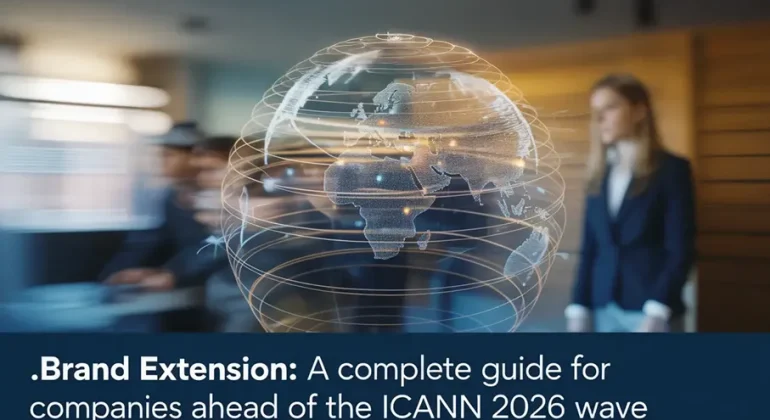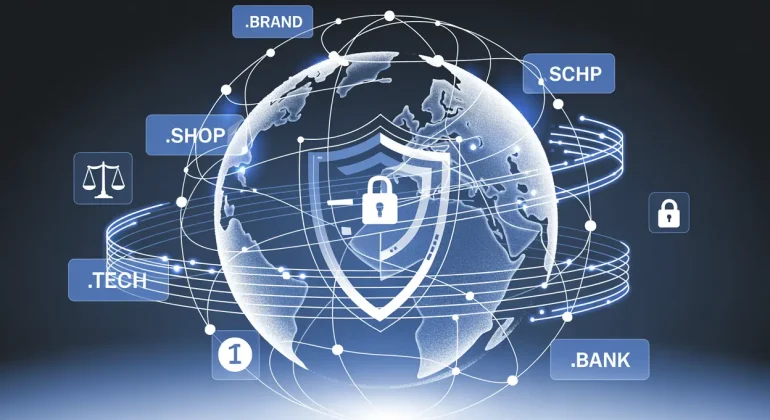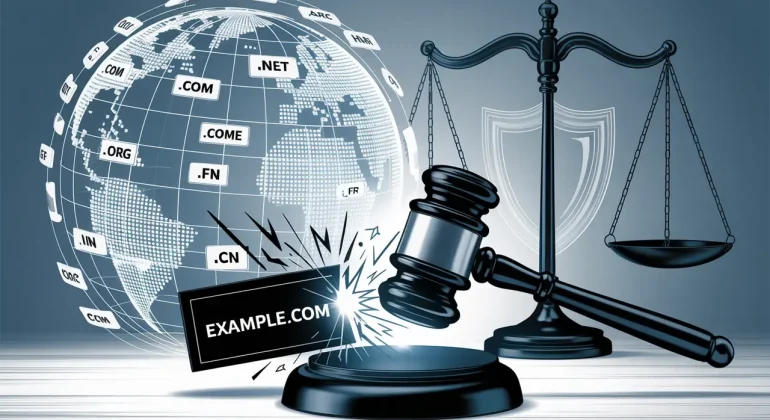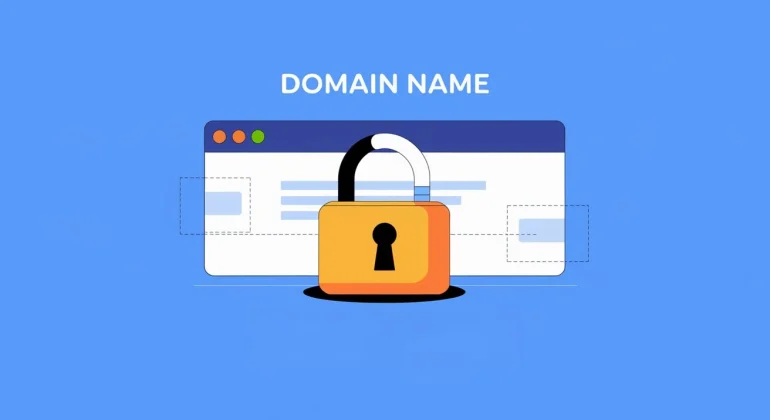Introduction to domain name disputes
In 2025, with over 370 million domain names registered worldwide and continuous growth in e-commerce, domain name disputes represent a major challenge for businesses, brands, and institutions. A hijacked domain name can result in a 15-25% loss in revenue according to a WIPO study.
Dispute resolution mechanisms vary by extension: while the UDRP procedure (Uniform Domain Name Dispute Resolution Policy) applies to generic domains (.com, .net, .org), each national registry develops its own solutions, such as SYRELI for .fr, INDRP for .in, or specific procedures for Chinese .cn domains.
Why is this article essential?
This comprehensive guide will enable you to:
- Understand different dispute resolution procedures
- Choose the optimal strategy according to your situation
- Estimate costs and timeframes for each procedure
- Discover recent case law and 2024-2025 trends
- Implement effective preventive protection
What is a domain name dispute?
Legal definition
A domain name dispute occurs when a third party registers a domain name that:
- Infringes on prior rights of a trademark holder
- Creates confusion in the public’s mind
- Diverts legitimate traffic to competing or malicious sites
- Harms the reputation of the brand or company
The 7 most common types of disputes
-
Cybersquatting (domain name warehousing)
- Definition: Speculative registration of famous domain names
- Objective: Resale at high prices to the legitimate holder
- Example: apple-store.com registered by a third party to be resold to Apple
-
Typosquatting (typographical hijacking)
- Definition: Registration of common misspelled variants
- Examples: amazone.com, gooogle.com, facebok.com
- Impact: Diverts 3-8% of traffic according to studies
-
Domain slamming (domain name scam)
- Technique: Sending false renewal invoices
- Trap: The holder believes they’re renewing but transfers to another registrar
- Prevalence: +45% in 2024 according to ICANN
-
Reverse domain name hijacking
- Definition: Abusive recovery attempt by the complainant
- Sanction: Adverse decision and possible damages
- Criteria: Manifest bad faith by the applicant
-
Commercial parasitism
- Method: Using the name to redirect to competition
- Damage: Direct loss of customers and revenue
- Affected sectors: E-commerce, services, luxury
-
Reputation attack (gripe sites)
- Objective: Criticize or denigrate a brand
- Forms: [brand]sucks.com, [brand]complaints.org
- Legal limits: Protection by freedom of expression in some cases
-
Phishing and fraud
- Danger: Identity theft and data theft
- Techniques: Similar names to deceive users
- Issues: Computer security and consumer protection
UDRP procedure: international standard for gTLDs
History and evolution of UDRP
The UDRP procedure was created in 1999 by ICANN to address the explosion of domain name disputes. Since its creation:
- Over 80,000 procedures have been initiated
- Average success rate: 85% for complainants
- Extensions covered: All gTLDs (.com, .net, .org, .info, .biz, etc.)
- Approved centers: WIPO, Forum, ADNDRC, CAC, CNNIC
Detailed admissibility criteria
The complainant must demonstrate cumulatively three conditions:
-
Identity or confusing similarity
Tests applied by experts:
- Visual test: Graphic comparison of signs
- Phonetic test: Similar pronunciation
- Conceptual test: Evocation of the same idea
- Extension consideration: Generally ignored in analysis
Jurisprudential examples:
✅ microsoft.com vs MICROSOFT trademark: perfect identity
✅ coca-cola.net vs COCA-COLA trademark: hyphen not determinant
❌ apple-trees.com vs APPLE trademark: significant addition modifying meaning
-
Absence of rights or legitimate interests
Evaluation criteria:
- Priority of registration compared to trademark rights
- Legitimate commercial use of the domain name
- Own notoriety of the holder under this name
- Fair non-commercial use (criticism, parody, information)
Accepted defense means:
- Prior good faith commercial exploitation
- Family name or first name of the holder
- Use for criticism (with limitations)
- Documented legitimate commercial project
-
Registration and use in bad faith
Bad faith indicators (non-exhaustive list):
At registration:
- Obvious knowledge of the trademark
- Registration of multiple variants
- History of cybersquatting by the holder
- Immediate buyback request
During use:
- Attempt to sell to trademark holder
- Direct unfair competition
- Phishing or malicious site
- Redirection to inappropriate content
- Advertising parking exploiting the trademark
Detailed UDRP procedure process
Phase 1: Preparation and filing (Duration: Variable)
- Mandatory preliminary analysis
- Verification of trademark rights
- Prior art search
- Analysis of domain name usage
- Success probability assessment
- Case file constitution
- Detailed complaint (generally 10-30 pages)
- Proof of trademark rights
- Elements demonstrating bad faith
- Certified translations if necessary
- Choice of center and language
- WIPO: 68% of procedures, recognized expertise
- Forum: 28% of procedures, speed
- ADNDRC: Asia-Pacific specialist
- Language: Agreement between parties, or registration contract language
Phase 2: Administrative review (3-5 days)
- Verification of file completeness
- Payment of fees (1,500 USD for single expert WIPO) plus variable counsel fees depending on case complexity
- Notification to respondent by email and mail
- Publication on center’s website
Phase 3: Respondent’s response (20 days)
Common defense strategies:
- Challenging complainant’s rights
- Demonstrating legitimate interest
- Proof of good faith
- “Reverse domain name hijacking” exception
Phase 4: Expert appointment (5 days)
UDRP expert profiles:
- Lawyers specialized in intellectual property
- International experience required
- Mandatory continuing education
- Certified independence and impartiality
Phase 5: Instruction and decision (14 days)
- Examination of evidence and arguments
- Possibility of additional information
- Legally motivated decision
- Publication of decision
UDRP statistics 2024
| Indicator |
Value |
2023-2024 evolution |
| Procedures initiated |
6,247 |
+12% |
| Complainant success rate |
87.3% |
+2.1% |
| Average duration |
52 days |
-3 days |
| Most litigious extensions |
.com (78%), .net (9%), .org (6%) |
Stable |
SYRELI: the French solution for .fr domains
Presentation of the French system
AFNIC (French Association for Internet Naming in Cooperation) manages the extensions .fr, .re, .pm, .yt, .tf, .wf. Since 2011, it offers two alternative procedures:
- SYRELI: Internet dispute extrajudicial resolution system
- PARL Expert: Online rapid arbitration procedure
SYRELI: detailed procedure
Filing conditions
The complainant must demonstrate that the domain name:
- Infringes on their rights (trademark, trade name, corporate name)
- Is registered or used illegally or abusively
Differences with UDRP:
- No explicit bad faith requirement, application of French law broader than UDRP
- Broader notion of “abusive use”
- Consideration of French law
SYRELI advantages
- Exceptional speed
- Average timeframe: 32 days
- Record: 18 days for simple cases
- 100% dematerialized procedure
- Affordable cost
- Free for respondent
- 250 EUR excl. tax fee for applicant (2025 rate) + variable counsel fees depending on case complexity
- No hidden or additional fees
- French expertise
- Experts in French and European law
- Knowledge of French market
- Decisions in French
- Procedural flexibility
- Possibility of prior mediation
- Exchanges in French only
- Adaptation to local specificities
SYRELI statistics 2024
| Metric |
Value |
Comment |
| Procedures processed |
187 |
+23% vs 2023 |
| Applicant success rate |
91% |
Historical record |
| Average timeframe |
32 days |
-4 days vs 2023 |
| Main sectors |
E-commerce (34%), Services (28%), Industry (18%) |
– |
PARL Expert: the WIPO alternative
Specificities
- Organized by: WIPO Arbitration and Mediation Center
- Experts: Specialized international panel
- Language: French or English
- Cost: 1,500 euros in fees (single expert), variable counsel fees should be budgeted depending on case complexity
When to choose PARL Expert?
- Complex disputes requiring international expertise
- Important economic stakes (> 100k€)
- Desired jurisprudential precedent
- International parties
Country-specific procedures and extensions
🇷🇺 Russian Federation (.ru, .рф)
2025 regulatory context
Since international sanctions in 2022, the Russian domain name system has evolved:
- Registry: Coordination Center for TLD RU
- Procedures: Private arbitration or Russian courts
- Constraints: Access limitations for foreign companies
Resolution mechanisms
- RU-CENTER arbitration
- Timeframe: 3-6 months
- Language: Russian mandatory
- Success rate: 65% (2024)
- Judicial procedure
- Competent courts: Moscow or respondent’s headquarters
- Timeframe: 6-18 months
- High cost with mandatory local representation
Legal specificities
- Applicable law: Russian Civil Code
- Evidence: Certified translation mandatory
- Enforcement: Complexity with current sanctions
🇨🇳 People’s Republic of China (.cn, .中国)
CNNIC system and procedures
Registry: China Internet Network Information Center Available procedures:
- CNNIC Policy (UDRP-inspired)
- CIETAC (China International Economic and Trade Arbitration Commission)
- Beijing Arbitration Commission
CNNIC domain name dispute resolution policy
Criteria (identical to UDRP):
- Identity/similarity with trademark
- Absence of legitimate rights
- Registration/use in bad faith
Chinese specificities:
- Enhanced consideration of registered Chinese trademarks
- Protection of Chinese geographical names
- Mandatory local expertise for certain sectors
It is also possible to act through the WIPO Arbitration and Mediation Center.
Approved arbitration centers
- Asian Domain Name Dispute Resolution Center (ADNDRC)
- Timeframe: 45-60 days
- Languages: Chinese, English
- Success rate: 89% (2024)
- CIETAC
- More traditional, longer procedures
- Recognized commercial expertise
- Higher cost
Notable 2024 case law
- Louis Vuitton vs malletlouis.cn: Transfer granted
- BMW vs bmw-parts.cn: Rejection for legitimate spare parts use
- McDonald’s vs 麦当劳.cn: Enhanced protection for Chinese characters
🇮🇳 India (.in, .भारत)
INDRP: IN domain name dispute resolution policy
Authority: National Internet Exchange of India (NIXI) Creation: 2005, revised in 2021
INDRP criteria (adapted to Indian context)
- Abusive registration: Broader notion than UDRP bad faith
- Prior rights: Indian trademarks privileged
- Legitimate use: Consideration of local commercial traditions
Procedural specificities
Approved centers:
- NIXI Panel: Indian and international experts
- WIPO India: Local WIPO branch
- CAM India: Arbitration and Mediation Center
Characteristics:
- Timeframe: 45-75 days
- Languages: English, Hindi
- Success rate: 82% (2024)
Case law trends
- Increased protection for Bollywood trademarks
- Recognition of Indian family names
- IT sector: Enhanced legitimate defenses
🇩🇪 Germany (.de)
DENIC and amicable resolution
Registry: DENIC eG Philosophy: Favor amicable solutions
Available procedures
- DENIC Konfliktlösung (conflict resolution)
- Free, based on good will
- Pure mediation without binding power. Otherwise, action before German courts is necessary
- Resolution rate: 45%
- DIS arbitration (Deutsche Institution für Schiedsgerichtsbarkeit)
- Formal paid procedure
- Timeframe: 3-6 months
- German courts
- Competence of Landgerichten
- Procedure: 6-18 months
- Technical expertise required
🇧🇷 Brazil (.br)
NIC.br and SACI procedure
System: SACI (Sistema de Solução de Conflitos de Internet) Managed by: Centro de Solução de Conflitos de Internet
SACI characteristics
- Total free for all parties
- Mandatory prior mediation
- Arbitration if mediation fails
- Overall timeframe: 60-90 days
Specific criteria
- Application of Brazilian law
- Enhanced protection for local trademarks
- Consideration of unregistered prior use
Practical guide: how to choose your procedure
Decision tree for choosing optimal procedure
-
Extension identification
Disputed domain name extension
├── gTLD (.com, .net, .org, .info, etc.) → UDRP
├── .fr, .re, .pm, .yt, .tf, .wf → SYRELI or PARL Expert
├── ccTLD with dedicated procedure (.cn, .in, .ru, etc.) → Local procedure
└── ccTLD without procedure → National courts
-
Choice criteria between procedures
For French extensions (.fr):
- SYRELI if: Simple case, limited budget, speed priority
- PARL Expert if: Complex case, important stakes, desired precedent
For gTLD with center choice:
- WIPO: Maximum expertise, complex cases
- Forum: Speed, standard cases
- ADNDRC: Disputes involving Asia
Multi-criteria decision matrix
| Criterion |
Weight |
UDRP/WIPO |
SYRELI |
Courts |
INDRP |
| Speed |
25% |
8/10 |
10/10 |
3/10 |
7/10 |
| Cost |
20% |
6/10 |
9/10 |
4/10 |
8/10 |
| Expertise |
20% |
10/10 |
8/10 |
9/10 |
7/10 |
| International recognition |
15% |
10/10 |
6/10 |
8/10 |
5/10 |
| Success rate |
10% |
9/10 |
9/10 |
7/10 |
8/10 |
| Procedural simplicity |
10% |
8/10 |
9/10 |
5/10 |
8/10 |
Practical cases and recommendations
Case 1: French startup victim of cybersquatting on .com
Situation: brand-startup.com registered by third party Recommendation: UDRP via WIPO Justification: .com extension, recognized procedure, acceptable timeframe
Case 2: SME with name.fr hijacked
Situation: Competitor uses similar name in .fr Recommendation: SYRELI Justification: Speed, cost, French expertise
Case 3: International group with multiple extensions
Situation: Coordinated cybersquatting .com/.cn/.in Recommendation: Combined UDRP + local procedures strategy Justification: Global approach, local expertise needed
Detailed comparative timeframes
Detailed timeframes by phase
UDRP (total timeframe: 45-65 days)
Preparatory phase (variable)
├── Analysis and counsel: 1-2 weeks
├── File constitution: 1-3 weeks
└── Filing and verification: 3-5 days
Contradictory phase (40 fixed days)
├── Respondent notification: 3 days
├── Response deadline: 20 days
├── Expert appointment: 5 days
├── Possible rejoinder: 5 days
└── Decision: 14 days
SYRELI (total timeframe: 20-45 days)
Accelerated processing
├── Filing and verification: 2-3 days
├── Notification: 2-3 days
├── Respondent response: 15 days
└── Decision: 10-15 days
ROI and cost/benefit analysis
Return on investment calculation
Positive factors:
- Recovery of diverted traffic
- Reputation protection
- Avoidance of judicial costs
- Resolution speed
Financial estimation:
- Monthly revenue loss (average): 5,000-50,000 EUR
- Extrajudicial procedure cost: 2,000-10,000 EUR
- Judicial procedure cost: 15,000-100,000 EUR
- Average extrajudicial procedure ROI: 300-500%
Case law and case studies 2024-2025
Major jurisprudential developments
-
Artificial intelligence and domain names
Trend: Multiplication of AI-related disputes Emblematic case: openai-gpt.com vs OpenAI Inc.
- Decision: Transfer granted (UDRP D2024-0234)
- Grounds: Commercial exploitation of reputation
- Impact: Extended protection to technological terms
-
Metaverse and Web3
Problem: Domain names linked to cryptocurrencies Example: ethereum-wallet.org vs Ethereum Foundation
- Complexity: Unregistered trademarks in some countries
- Solution: Proof of international notoriety
- Teaching: Necessary anticipation for tech brands
-
Evolution of bad faith criteria
New recognized indicators:
- Use of misleading SSL certificates
- Exploitation of mobile typing errors
- Creation of AI-generated content imitating the brand
- Paid referencing on the brand name
Case analysis by business sector
Luxury sector
Louis Vuitton vs lvbags-outlet.com (UDRP D2024-1156)
- Context: Counterfeiting site
- Defense: Authorized reseller (false)
- Decision: Transfer + damages
- Lesson: Enhanced surveillance necessary
Chanel vs chanelperfumes.net (SYRELI 2024-FR-0089)
- Particularity: French respondent
- Defense argument: Generic name “perfumes”
- Decision: Transfer (famous trademark prevails)
- Timeframe: 23-day record
Technology sector
Microsoft vs microsoft-teams-download.org
- Problem: Malware distribution
- Urgency: Interim injunction obtained
- Procedure: UDRP + criminal action
- Result: Transfer + prosecution
E-commerce and marketplaces
Amazon vs amazon-prime-deals.com
- Technique: Disguised affiliation
- Difficulty: Proving lack of authorization
- Solution: Production of affiliation contracts
- Outcome: Transfer granted
Remarkable decisions by jurisdiction
WIPO 2024 decisions
Top 3 most cited decisions:
- Nike Inc. vs sportswear-nike.online (D2024-0567)
- Innovation: Social media consideration
- Impact: Broadening of bad faith notion
- Airbnb vs airbnb-stays.travel (D2024-0789)
- Question: .travel extension and legitimacy
- Answer: Extension doesn’t automatically confer legitimacy
- Tesla vs tesla-autopilot.ai (D2024-0912)
- Issue: Technical term vs trademark
- Teaching: Commercial context determining
SYRELI developments
2024 qualitative statistics:
- 91% success for applicants (record)
- 32 days average timeframe (-4 days)
- Growing sectors: Health (+67%), FinTech (+45%)
Landmark decision: sante-covid.fr
- Context: Medical disinformation site
- Applicant: Ministry of Health
- Defense: Freedom of expression
- Decision: Transfer (public order priority)
- Timeframe: 18 days (emergency procedure)
Reverse domain name hijacking: sanctioned cases
Definition and sanctions
Reverse domain name hijacking (RDNH) sanctions abusive complainants who:
- Use UDRP procedure improperly
- Have no legitimate rights to the name
- Act knowingly
Applied sanctions:
- Mention in decision
- Damages in certain jurisdictions
- Blacklisting by centers
Recent sanctioned cases
Facebook vs face-book.com (D2024-0445)
- Error: Name registered before Facebook creation
- Sanction: RDNH established
- Cost: 50,000 USD in damages
Apple vs apple-trees.org (D2024-0678)
- Context: Legitimate gardening site
- Abuse: Portfolio expansion attempt
- Result: RDNH + respondent’s attorney fees
Preventive protection strategies
Optimal domain name portfolio
-
Essential extensions by company type
French local SME:
- .fr (mandatory)
- .com (recommended)
- .eu (if European activity)
International company:
- .com, .net, .org (classic triptych)
- ccTLD of strategic markets (.de, .uk, .cn, .in)
- New sectoral gTLD (.tech, .shop, .finance)
Luxury brand:
- Maximum protection: 50+ extensions
- Extended surveillance: variations and typos
- Premium extensions: .luxury, .fashion, .style
-
Defensive naming strategies
Spelling variations:
- Hyphen: brand-name.com, brandname.com
- Plurals: brands.com, brand.com
- Abbreviations: br-and.com, brnd.com
Typosquatting protection:
- Adjacent characters: nrand.com, bramd.com
- Omissions: brand.com, brnd.com
- Doubles: bbrand.com, brandd.com
Optimal number calculation:
Risk score = (Reputation × Digital revenue × Sensitive sector) / 1000
Number of domains = Score × 15 + priority extensions
Automated surveillance and monitoring
-
Recommended monitoring tools
Professional solutions:
IPzen (Harbor Technologies)
- Coverage: 1000+ extensions
- Alerts: Real-time
- Cost: 500-1500 EUR/year/brand
- Advantages: Legal security, limits risk of abusive actions, can also manage UDRP and other alternative dispute resolution procedures
-
Setting up effective monitoring
Optimal configuration:
- Main keywords: Exact trademark
- Variations: +50 typographical variants
- Extensions: Priority + extended surveillance
- Frequency: Daily for sensitive brands
Alert processing workflow:
Alert detected
├── Automatic analysis (AI/rules)
├── Risk classification (High/Medium/Low)
├── Legal team notification
├── Action according to established procedure
└── Follow-up and monthly reporting
Contracts and preventive clauses
-
Clauses in commercial contracts
Distributors and resellers:
Article X – Domain names
The distributor is prohibited from registering any domain name
incorporating the [BRAND] trademark without prior written
authorization from the grantor. In case of violation, the grantor
may require immediate transfer without compensation.
Employees and executives:
Article Y – Digital intellectual property
The employee undertakes not to register domain names
related to the company’s activity, except by express mission.
Any unauthorized registration will be considered a violation
of the duty of loyalty.
-
Enhanced general terms of sale
Protection against wild affiliation:
- Prohibition on using the name in domains
- Obligation to declare promotional sites
- Sanctions in case of violation
Rapid response plan
-
Emergency procedures
Detection of new suspicious domain:
- H+2: Verification and documentation
- H+24: Strategy decision (negotiation/procedure)
- D+3: Implementation of chosen action
- D+7: First effectiveness assessment
Escalation according to risk:
- Low risk: Amicable negotiation
- Medium risk: Formal notice + procedure
- High risk: Immediate procedure + injunction if necessary
-
Dedicated team and responsibilities
Recommended composition:
- IP lawyer: Strategic decision
- Digital manager: Technical assessment
- General management: Budget validation
- External counsel: Procedural expertise
Complete FAQ – domain name disputes
General questions
Q1: What differentiates a domain name from a trademark?
A: A domain name is a technical address on the Internet, while a trademark is a distinctive sign protected by intellectual property law. Conflict arises when a domain name incorporates a trademark without authorization, creating confusion for consumers.
A trademark benefits from strong legal protection upon registration, while domain name registration only confers technical usage rights to this Internet address.
Q2: How long does it take to recover a domain name?
A: Timeframes vary by procedure:
- SYRELI (.fr): 20-45 days on average
- UDRP (gTLD): 45-65 days
- National procedures: 60-120 days
- Courts: 6-24 months
The speed record belongs to SYRELI with 18 days for a health emergency case in 2024.
Q3: Can I recover a domain name without having a registered trademark?
A: It’s very difficult but not impossible. You can rely on:
- Trade name used previously
- Prior corporate name
- Copyright on the name
- Notoriety acquired without registration
However, 90% of successful procedures rely on a registered trademark, which constitutes the strongest proof of your rights.
Q4: What to do if I receive a formal notice for my domain name?
A: Don’t panic and follow these steps:
- Analyze the legitimacy of the demand
- Verify your rights to the name (anteriority, legitimate use)
- Document your good faith (screenshots, usage proof)
- Consult a specialist before responding
- Negotiate if relevant or prepare your defense
Important: Never transfer the domain immediately under pressure.
Technical questions about procedures
Q5: What’s the difference between UDRP and SYRELI?
A:
| Criterion |
UDRP |
SYRELI |
| Extensions |
gTLD (.com, .net, .org…) |
.fr and overseas territories |
| Cost (fee) |
1,500 USD (WIPO) |
250 EUR excl. tax |
| Timeframe |
45-65 days |
20-45 days |
| Language |
Primarily English |
French only |
| Criteria |
3 strict cumulative conditions |
Rights infringement + abusive use |
| Recognition |
International |
France and francophone countries |
Q6: Can I appeal a UDRP, SYRELI, or PARL Expert decision?
A:
- UDRP: No appeal possible, but judicial action
- SYRELI: No appeal, but judicial recourse possible
- PARL Expert: No appeal, but judicial recourse possible
Judicial appeal suspends execution of transfer decision.
Q7: How to prove bad faith in a UDRP procedure?
A: Most effective bad faith indicators:
At registration:
- Obvious knowledge of your trademark
- Registration of multiple variations
- Immediate buyback request
- History of cybersquatting
During use:
- Phishing site or direct competitor
- Advertising parking exploiting your trademark
- High-price sale attempt
- Total absence of use (warehousing)
Evidence to constitute:
- Time-stamped screenshots
- Negotiation emails
- Traffic analyses
- Research on the holder
Q8: How much does a UDRP procedure really cost?
A: Typical total cost for a UDRP procedure:
Direct fees:
- WIPO (1 expert): 1,500 USD
- Forum (1 expert): 1,350 USD but there may be other fees depending on responses and suspensions
Indirect fees:
- Attorney/counsel fees: 1,000-8,000 EUR
- Translations: 500-2,000 EUR
- Investigations: 500-2,000 EUR
Global budget: 3,000-12,000 EUR depending on case complexity
For an SME, SYRELI remains the most economical option: 250 EUR + 1,500-3,000 EUR in fees = total budget < 3,500 EUR.
Strategic questions
Q9: Should I negotiate or go directly to procedure?
A: Prior negotiation is recommended if:
- The holder seems in good faith
- Usage is not directly competitive
- Buyback cost remains reasonable (< procedure cost)
- Time is not critical
Go directly to procedure if:
- Manifestly fraudulent usage
- Extortion attempt
- Direct competitor
- Phishing/malware site
Statistic: 60% of negotiations succeed in < 30 days with an average cost of 900-5,000 EUR.
Q10: How to effectively protect my brand on the Internet?
A: 5-level protection strategy:
Level 1 – Basic protection:
- Registration .com + .fr + target country extensions
- Monthly automated surveillance
- Clauses in commercial contracts
Level 2 – Enhanced protection:
- +10 priority extensions
- Main spelling variations
- Weekly surveillance
Level 3 – Extended protection:
- +30 sectoral extensions
- Complete typosquatting protection
- Daily surveillance + social networks
Level 4 – Maximum protection:
- 100+ domain names
- Advanced detection AI
- Dedicated internal team
Annual budget indication:
- Level 1: 1,000-3,000 EUR
- Level 2: 5,000-15,000 EUR
- Level 3: 15,000-50,000 EUR
- Level 4: 50,000+ EUR
Q11: What to do in case of massive cybersquatting on my brand? A: Graduated response strategy:
Phase 1 – Assessment (1-2 weeks)
- Complete inventory of infringing domains
- Classification by risk level
- Recovery cost evaluation
Phase 2 – Priority actions (1 month)
- Procedures on high-risk domains
- Negotiations on intermediate cases
- Enhanced monitoring
Phase 3 – Systematic cleanup (3-6 months)
- Grouped procedures
- Legal action if necessary
- Implementation of preventive protection
Total cost: 10,000-100,000 EUR depending on scope, but ROI generally > 300%.
Q12: How to know if my domain name has chances of being recovered? A: Quick self-assessment (scoring out of 100):
Prior rights (30 points max):
- Identical registered trademark: 30 pts
- Similar trademark: 20 pts
- Prior trade name: 15 pts
- No formal rights: 0 pt
Usage of the disputed domain (40 points max):
- Direct competitor site: 40 pts
- Brand advertising parking: 35 pts
- Sale/negotiation: 30 pts
- Generic unrelated site: 10 pts
- No usage: 20 pts
Evidence of bad faith (30 points max):
- Extortion attempt: 30 pts
- Registration post-notoriety: 25 pts
- Multiple similar domains: 20 pts
- Masked/false contact: 15 pts
Results interpretation:
- 80-100 points: Very good chances (>90%)
- 60-79 points: Good chances (70-90%)
- 40-59 points: Average chances (50-70%)
- <40 points: Low chances (<50%)
Conclusion: Towards optimal digital protection
In 2025, domain name protection constitutes a major strategic issue for any organization with a digital presence. The constant evolution of extensions, the emergence of new forms of cybersquatting and the increasing complexity of the international legal landscape make a structured and preventive approach essential.
Key points to remember
- Diversity of solutions: Each extension has its specific mechanisms
- Effectiveness of extrajudicial procedures: 85-90% success rate
- Importance of speed: The earlier the action, the better the chances
- Positive ROI: Recovery procedures are generally profitable
- Essential prevention: Better to protect than to suffer
Dreyfus Law Firm expertise
With more than 20 years of experience in intellectual property and new technologies law, Dreyfus Law Firm assists its clients in:
- Domain name portfolio audit
- Personalized preventive protection strategies
- UDRP, SYRELI, PAR Expert and international recovery procedures
- Amicable negotiations and mediation
- Automated monitoring and legal watch
- Internal team training
Future developments to anticipate
2025-2026: Emerging trends
- Generative AI and new types of counterfeiting
- Metaverse and virtual brand protection
- Blockchain and decentralized domain names
- Reinforced European regulation (DSA/DMA)
Our commitment: Accompanying our clients through these changes for excellent digital protection.
Need help protecting your domain names?










